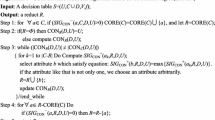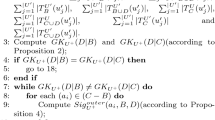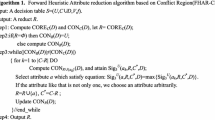Abstract
In the era of big data, discovering knowledge from incomplete and mixed complex systems is an important research topic that has always been the focus and favor of researchers. Attribute reduction is one of the important research contents in the fields of knowledge discovery, data mining and etc. For improving the performance of attribute reduction, some scholars have proposed many approaches and acceleration mechanisms. As an effective data processing model, the matrix has some bottlenecks in obtaining the reduct efficiently, and there is less research on its accelerated reduction strategies and algorithms. Therefore, the main motivation of this article is to explore and apply various acceleration strategies in matrix reduction methods to improve the efficiency of knowledge discovery in incomplete hybrid decisions systems (IHDSs). First, for incomplete mixed data, the combination tolerance relation is presented. Based on the combination tolerance relation, the corresponding operations and properties of the related matrix are studied, and a matrix-based positive region reduction method is proposed. Next, we develop the incremental computing strategy for updating the matrices to avoid re-calculation and the gradually reducing processing scale strategy for compressing the processing volume in the reduction process; then, two types of matrix-based heuristic reduction acceleration algorithms are designed to obtain a reduct of IHDSs. Finally, some experiments are carried out on nine typical data sets in 15 UCI data sets to verify the effectiveness and efficiency of proposed algorithms.








Similar content being viewed by others
References
Chen HM, Li TR, Fan X, Luo C (2019) Feature selection for imbalanced data based on neighborhood rough sets. Inf Sci 483:1–20
Chen Y, Liu KY, Song JJ, Fujita H, Yang XB, Qian YH (2020) Attribute group for attribute reduction. Inf Sci 535:64–80
Chen Y, Yang XB, Li JH, Wang PX, Qian YH (2022) Fusing attribute reduction accelerators. Inf Sci 587:354–370
Chen YM, Zhang ZJ, Zheng JZ, Ma Y, Xue Y (2017) Gene selection for tumor classification using neighborhood rough sets and entropy measures. J Biomed Inform 67:59–68
Chen Z, Liu KY, Yang XB, Fujita H (2022) Random sampling accelerator for attribute reduction. Int J Approx Reason 140:75–91
Dai JH (2013) Rough set approach to incomplete numerical data. Inf Sci 241:43–57
Ge H, Li LS, Xu Y, Yang CJ (2015) Bidirectional heuristic attribute reduction based on conflict region. Soft Comput 19(7):1973–1986
Ge H, Li LS, Xu Y, Yang CJ (2017) Quick general reduction algorithms for inconsistent decision tables. Int J Approx Reason 82:56–80
Ge H, Yang CJ, Xu Y (2022) Incremental updating three-way regions with variations of objects and attributes in incomplete neighborhood systems. Inf Sci 584:479–502
He Q, Wu CX, Chen DG, Zhao SY (2011) Fuzzy rough set based attribute reduction for information systems with fuzzy decisions. Knowl-Based Syst 24(5):689–696
Hu M, Tsang ECC, Guo YT, Chen DG, Xu WH (2021) A novel approach to attribute reduction based on weighted neighborhood rough sets. Knowl-Based Syst 220:106908
Hu QH, Yu DR, Liu JF, Wu CX (2008) Neighborhood rough set based heterogeneous feature subset selection. Inf Sci 178(18):3577–3594
Hu QH, Yu DR, Xie ZX (2008) Neighborhood classifiers. Expert Syst Appl 34:866–876
Huang YY, Li TR, Luo C, Fujita H, Horng SJ (2020) Bin Wang, Dynamic maintenance of rough approximations in multi-source hybrid information systems. Inf Sci 530:108–127
Jiang ZH, Yang XB, Yu HL, Liu D, Wang PX, Qian YH (2019) Accelerator for multi-granularity attribute reduction. Knowl-Based Syst 177:145–158
Kryszkiewicz M (1998) Rough set approach to incomplete information systems. Inf Sci 112(1):39–49
Kim KJ, Jun CH (2018) Rough set model based feature selection for mixed-type data with feature space decomposition. Expert Syst Appl 103:196–205
Lang GM, Li QG, Cai MJ, Yang T (2015) Characteristic matrixes-based knowledge reduction in dynamic covering decision information systems. Knowl-Based Syst 85:1–26
Liang JY, Wang F, Dang CY, Qian YH (2012) An efficient rough feature selection algorithm with a multi-granulation view. Int J Approx Reason 53:912–926
Leung Y, Li DY (2003) Maximal consistent block technique for rule acquisition in incomplete information systems. Inf Sci 153:85–106
Lin TY (1997) Neighborhood systems: a qualitative theory for fuzzy and rough sets. Adv Mach Intell Soft Comput 6:132–155
Liu Y, Huang WL, Jiang YL, Zeng ZY (2014) Quick attribute reduct algorithm for neighborhood rough set model. Inf Sci 271:65–81
Liu GL, Feng YB, Yang JT (2020) A common attribute reduction form for information systems. Knowl-Based Syst 193:105466
Ni P, Zhao SY, Wang XZ, Chen H, Li CP (2019) PARA: a positive-region based attribute reduction accelerator. Inf Sci 503:533–550
Thuy NN, Wongthanavasu S (2020) An efficient stripped cover-based accelerator for reduction of attributes in incomplete decision tables. Expert Syst Appl 143:113076
Pawlak Z, Wong SKM, Ziarko W (1988) Rough sets: probabilistic versus deterministic approach. Inf Sci 29:81–95
Qian YH, Liang JY, Pedrycz W, Dang CY (2011) An efficient accelerator for attribute reduction from incomplete data in rough set framework. Pattern Recogn 44(8):1658–1670
Qian YH, Liang JY, Li DY, Wang F, Ma NN (2010) Approximation reduction in inconsistent incomplete decision tables. Knowl-Based Syst 23(5):427–433
Qian WB, Shu WH (2018) Attribute reduction in incomplete ordered information systems with fuzzy decision. Appl Soft Comput 73:242–253
Slowinski R, Vanderpooten D (2000) A generalized definition of rough approximations based on similarity. IEEE Trans Knowl Data Eng 12(2):331–336
Skowron A, Rauszer C (1992) The discernibility matrices and functions in information systems. Intell Decis Support 11:331–362
Sun L, Wang LY, Qian YH, Xu JC, Zhang SG (2019) Feature selection using Lebesgue and entropy measures for incomplete neighborhood decision systems. Knowl-Based Syst 186:104942
Sun L, Wang LY, Ding WP, Qian YH, Xu JC (2020) Neighborhood multi-granulation rough sets-based attribute reduction using Lebesgue and entropy measures in incomplete neighborhood decision systems. Knowl-Based Syst 192:105373
Shu WH, Qian WB (2014) A fast approach to attribute reduction from perspective of attribute measures in incomplete decision systems. Knowl-Based Syst 72:60–71
Tan AH, Wu WZ, Li JJ, Li TJ (2020) Reduction foundation with multigranulation rough sets using discernibility. Artif Intell Rev 53(4):2425–2452
Tan AH, Li JJ, Lin GP, Lin YJ (2015) Fast approach to knowledge acquisition in covering information systems using matrix operations. Knowl-Based Syst 79:90–98
Thuy NN, Wongthanavasu S (2020) A new approach for reduction of attributes based on stripped quotient sets. Pattern Recogn 97:106999
Tsang CCE, Chen DG, Yueng SD, Lee WTJ, Wang XZ (2008) Attribute reduction using fuzzy rough sets. IEEE Trans Fuzzy Syst 16(5):1130–1141
Urszula S, Beata Z (2020) Heuristic-based feature selection for rough set approach. Int J Approx Reason 125:187–202
Yenny VR (2019) Maximal similarity granular rough sets for mixed and incomplete information systems. Soft Comput 23(13):4617–4631
Wang SP, Zhu QX, Zhu W, Min F (2014) Graph and matrix approaches to rough sets through matroids. Inf Sci 288:1–11
Wang CZ, Shi YP, Fan XD, Shao MW (2019) Attribute reduction based on k-nearest neighborhood rough sets. Int J Approx Reason 106:18–31
Wang CZ, Shao MW, Sun BQ, Hu QH (2015) An improved attribute reduction scheme with covering based rough sets. Appl Soft Comput 26:235–243
Wang CZ, Hu QH, Wang XZ, Chen DG, Qian YH, Dong Z (2018) Feature selection based on neighborhood discrimination index. IEEE Trans Neural Netw Learn Syst 29(7):2986–2999
Wang X, Wang XP, Yang XB, Yao YY (2021) Attribution reduction based on sequential three-way search of granularity. Int J Mach Learn Cybern 12:1339–1458
Xia SY, Zhang Z, Li WH, Wang GY, Giem E, Chen ZZ (2022) GBNRS: a novel rough set algorithm for fast adaptive attribute reduction in classification. IEEE Trans Knowl Data Eng 34(3):1231–1242
Xie JJ, Hu BQ, Jiang HB (2022) A novel method to attribute reduction based on weighted neighborhood probabilistic rough sets. Int J Approx Reason 144:1–17
Xie XJ, Qin XL (2018) A novel incremental attribute reduction approach for dynamic incomplete decision systems. Int J Approx Reason 93:443–462
Xu WH, Li Y, Liao XW (2012) Approaches to attribute reductions based on rough set and matrix computation in inconsistent ordered information systems. Knowl-Based Syst 27:78–91
Yang X, Li MM, Fujita H, Liu D, Li TR (2022) Incremental rough reduction with stable attribute group. Inf Sci 589:283–299
Yang XL, Chen HM, Li TR, Wan JH, Sang BB (2021) Neighborhood rough sets with distance metric learning for feature selection. Knowl-Based Syst 224:107076
Yao YY, Zhao Y (2009) Discernibility matrix simplification for constructing attribute reducts. Inf Sci 179(5):867–882
Zhao H, Qin KY (2014) Mixed feature selection in incomplete decision table. Knowl-Based Syst 57:181–190
Zhang JB, Li TR, Chen HM (2014) Composite rough sets for dynamic data mining. Inf Sci 257:81–100
Zou L, Ren SY, Sun YB, Yang XH (2023) Attribute reduction algorithm of neighborhood rough set based on supervised granulation and its application. Soft Comput 27(3):1565–1582
Acknowledgements
Research on this work is partially supported by the Natural Science Foundation of China (No. 62076002), the Natural Science Foundation of Anhui Province (Nos. 2108085MF215 and 2008085MF194), the Higher Education Natural Science Foundation of Anhui Province (No. KJ2020ZD63), the 2023 Anhui Higher Education Natural Science Foundation Key Project from Yang Chuanjian’s (No. 2023AH051600), and the Open Foundation of Key Laboratory of Intelligence Computation and Signal Processing of Education Ministry.
Author information
Authors and Affiliations
Corresponding author
Additional information
Publisher's Note
Springer Nature remains neutral with regard to jurisdictional claims in published maps and institutional affiliations.
Rights and permissions
Springer Nature or its licensor (e.g. a society or other partner) holds exclusive rights to this article under a publishing agreement with the author(s) or other rightsholder(s); author self-archiving of the accepted manuscript version of this article is solely governed by the terms of such publishing agreement and applicable law.
About this article
Cite this article
Ge, H., Yang, C., Xu, Y. et al. Quick reduct with multi-acceleration strategies in incomplete hybrid decision systems. Int. J. Mach. Learn. & Cyber. 15, 1227–1260 (2024). https://doi.org/10.1007/s13042-023-01965-9
Received:
Accepted:
Published:
Issue Date:
DOI: https://doi.org/10.1007/s13042-023-01965-9




